
Afrobeat is a West African music genre that involves the combination of West African musical styles from mainly Nigeria such as the traditional Yoruba and Igbo music and highlife with American funk, jazz, and soul influences. With a focus on chanted vocals, complex intersecting rhythms, and percussion. The style was pioneered in the 1960s by Nigerian multi-instrumentalist and bandleader Fela Kuti, who is most known for popularizing the style both within and outside Nigeria. At the height of his popularity, he was referred to as one of Africa's most "challenging and charismatic music performers."

The music of Nigeria includes many kinds of folk and popular music. Little of the country's music history prior to European contact has been preserved, although bronze carvings dating back to the 16th and 17th centuries have been found depicting musicians and their instruments. The country's most internationally renowned genres are Indigenous, Apala, Aurrebbe music, Rara music, Were music, Ogene, Fuji, Jùjú, Afrobeat, Afrobeats, Igbo highlife, Afro-juju, Waka, Igbo rap, Gospel,Nigerian pop and Yo-pop. Styles of folk music are related to the over 250 ethnic groups in the country, each with their own techniques, instruments, and songs. The largest ethnic groups are the Igbo, Hausa and Yoruba. Traditional music from Nigeria and throughout Africa is often functional; in other words, it is performed to mark a ritual such as the wedding or funeral and not to achieve artistic goals. Although some Nigerians, especially children and the elderly, play instruments for their own amusement, solo performance is otherwise rare. Music is closely linked to agriculture, and there are restrictions on, for example, which instruments can be played during different parts of the planting season.

Tony Oladipo Allen was a Nigerian and French drummer, composer, and songwriter who lived and worked in Paris, France. Allen was the drummer and musical director of Fela Kuti's band Africa '70 from 1968 to 1979, and was one of the founders of the Afrobeat genre. Fela once stated that "without Tony Allen, there would be no Afrobeat". He was described by Brian Eno as "perhaps the greatest drummer who has ever lived".
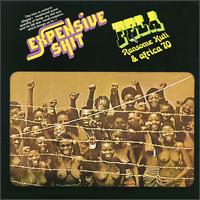
Expensive Shit is the twelfth full-length album by pioneering Afrobeat artist Fela Kuti and his Africa '70 band, released in 1975. It was reissued in 2000 by MCA Records, packaged with Kuti's He Miss Road (1975) on the same CD.
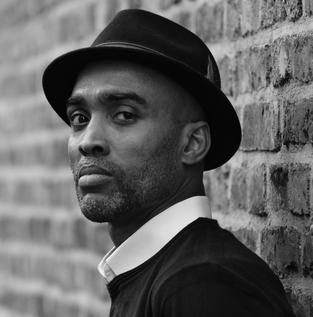
Adegoke Odukoya, better known as Ade Bantu, is a Nigerian-German musician, producer and social activist who is the front man of the 13 piece band BANTU and the creator of the monthly concert series and music Festival Afropolitan Vibes which holds in Lagos, Nigeria. Ade Bantu is also the founder of the Afro-German musical collective Brothers Keepers. His band BANTU received the Kora Award for their album Fuji Satisfaction in 2005.
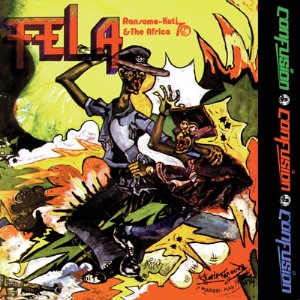
Confusion is a 1975 album by Nigerian Afrobeat musician Fela Kuti and his Africa 70 band. It was arranged, composed, and produced by Kuti, who recorded the album after choosing to emphasize his African heritage and nationalism in his music. Confusion is a commentary on the confused state of post-colonial Lagos and its lack of infrastructure and proper leadership at the time. Kuti's pidgin English lyrics depict difficult conditions in the city, including a frenetic, multilingual trading market and inextricable traffic jams in Lagos' major intersections.

Sorrow Tears and Blood is an album by Nigerian Afrobeat composer, bandleader, and multi-instrumentalist Fela Kuti. It was recorded in 1977 and originally released on the Nigerian Kalakuta label.

L.I.F.E is the debut studio album by Nigerian singer Burna Boy. It was released on August 12, 2013, by Aristokrat Records. The album serves as the follow-up to his second mixtape, Burn Identity (2011), and sold 40,000 copies on the first day of its release. Aristokrat Records later sold the album's marketing rights to Uba Pacific for ₦10 million. L.I.F.E was supported by the singles "Like to Party", "Tonight", "Always Love You", "Run My Race" and "Yawa Dey". The album was produced entirely by Leriq and features guest appearances from 2face Idibia, M.I, Timaya, Olamide, Reminisce and Wizkid.

Damini Ebunoluwa Ogulu , who is known professionally as Burna Boy, is a Nigerian singer, songwriter and record producer. He rose to stardom in 2012 after releasing "Like to Party", the lead single from his debut studio album L.I.F.E (2013). In 2017, Burna Boy signed with Atlantic Records in the United States to release his third studio album, Outside (2018).

Felabration is an annual music festival conceived in 1998 by Yeni Anikulapo-Kuti in memory and celebration of her father Fela Kuti, a Nigerian musician and human rights activist known for pioneering the afrobeat genre of music. The one-week-long event which is held annually at the New Afrika Shrine in Ikeja, attracts visitors from different countries and has thus been considered as an official tourist destination by the Lagos State Government.
Abiodun Odukoya, better known as Abiodun, is a Nigerian-German singer, songwriter, producer and music arranger. Abiodun's name is of Yoruba origin and means "he who is born on a day of festivity". He is better known as the co founder of the Afro German music collective Brothers Keepers and as one of the pioneers of the German reggae, afro and soul music scene.
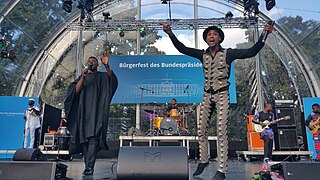
Bantu is a 13-piece band based in Lagos, Nigeria. Their music is a fusion of Afrofunk, Afrobeat, highlife and Yoruba music. The group features multi-instrumentalists and singers who perform as a collective.
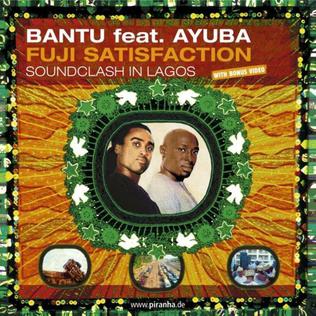
Fuji Satisfaction: Soundclash In Lagos is a studio album by BANTU. The album features vocal contributions by Nigerian Fuji musician Adewale Ayuba. It was recorded between April and December 2004 at various studios in Cologne, Berlin and Lagos, Nigeria. The album was released in June 2005 by Piranha Music. Producer Herb V produced the album by combining programmed beats and samples with Yoruba percussion instruments like the Sakara, Apala, Omele, Bata and Iya Ilu drums, Additional production and instrumentation was provided by the Berlin-based Afrobeat Academy Band. The Subject matter on Fuji Satisfaction deals with Pan Africanism, homophobia and Yoruba identity. The album marked a turning point for BANTU as it took them closer to their Yoruba roots. It also stretched conventional perception of Fuji music by fusing it with Hiphop, Dancehall, Afrobeat and Afrofunk elements. The album debuted at number 2 on the European World Music Charts. BANTU was awarded the Kora Awards in the categories "Best Group West Africa" and "Best Group Africa" for Fuji Satisfaction

Agberos International is the 5th studio album by BANTU. The album was composed and written by all 13 members of the band. It was recorded live in Lagos, Nigeria, over six years. The title of the album Agberos International was inspired by Lagos public bus conductors known as agberos who attract customers to board their vehicles through their wild gesticulations and loud voices. The album was released on 7 July 2017 by Soledad Productions. The subject matter on Agberos International is centered around the Niger Delta crisis, oppressive Western policies and the blind African ruling class.
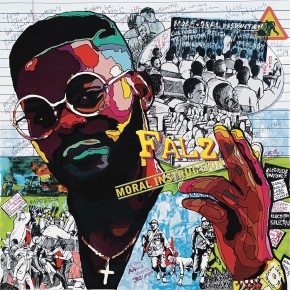
Moral Instruction is the fourth studio album by Nigerian rapper Falz. It was released on January 15, 2019, by Bahd Guys Entertainment. The album was recorded in Nigerian pidgin and samples musical recordings from Fela Kuti. Its production was primarily handled by Sess, with additional production from TMXO, Willis, and Chillz. The album features collaborations with Demmie Vee, Chillz and Sess. Moral Instruction addresses societal issues such as corrupt politicians, corruption, police brutality, prostitution, social injustice and internet fraud. The album's release was preceded by "Talk", a socio-conscious record that addresses critical events. The cover art for Moral Instruction was created by Nigerian artist Lemi Ghariokwu, a long-time Fela collaborator. The album won Best Rap Album and Album of the Year at The Headies 2019.

Fufu is the first studio album by BANTU. The album consists of collective and individual compositions by all four founding members of the group: Patrice, Amaechi Okerenkwo, Abiodun & Ade Bantu. It was released by the Nigerian music label Kennis Music. The album earned BANTU two radio hit singles in Nigeria for the songs “Nzogbu” & “Fire Inna Dancehall”
Afrobeats is an umbrella term to describe popular music from West Africa and the diaspora that initially developed in Nigeria, Ghana, and the UK in the 2000s and 2010s. Afrobeats is less of a style per se, and more of a descriptor for the fusion of sounds flowing majorly out of Nigeria. Genres such as hiplife, jùjú music, highlife and naija beats, among others, were amalgamated under the "Afrobeats" umbrella.

Ọmọ́rìnmádé Kútì known professionally as Made Kuti, is a Nigerian afrobeat singer, songwriter and instrumentalist. He released his debut album titled For(e)ward in 2021.
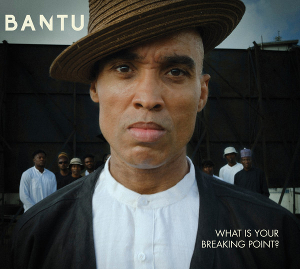
What Is Your Breaking Point? is the seventh studio album by Afrobeat and Afrofunk collective BANTU released on June 9, 2023, on Soledad Productions. The album features a unique fusion of Afrobeat, Afrofunk and various Yourba musical influences. It explores themes of Africa's brain drain, post colonial trauma, gender oppression and social class discrimination.

















